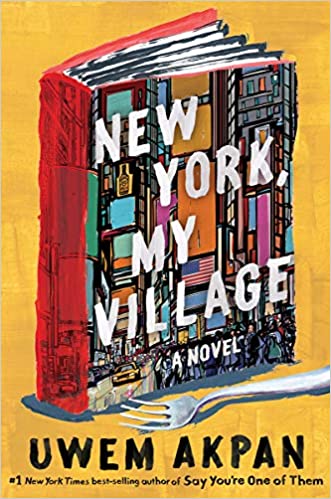NEW YORK, MY VILLAGE

by Uwem Akpan
W.W. Norton & Co.
(www.wwnorton.com)
2021, 386 pages, $27.95
ISBN 978-0-393-87280-4
Click here to purchase
Why do humans wage war? Why do we instill our often fascist, repressive and violently controlling ways on other people?
Are wars created to take or protect territory? Is power an addictive drug that we cannot stop taking, sort of a Poe-like imp of the perverse, some monstrosity that permits us — that actually somehow drives and compels us — to display our own prejudices and bigotry?
NEW YORK, MY VILLAGE is a story about Ekong Udousoro, a fiction editor who takes a journey, far from his Nigerian home, at the invitation of his American publisher, Andrew & Thompson, to its offices in New York City.
Ekong details his experiences in the U.S., and the voyages he takes in and about Manhattan and environs. Everywhere he ventures, all the places he ends up, flagrantly reveal undaunted racism, like a sort of social chronic affliction, even showing up in those who have little or no experiences in the past that would make them racist.
But yet Ekong sees it, experiences it, in all of racism’s blatant and subtle forms. There are times in the novel that reflect on what the causes of racism — and perhaps a cure that Ekong searches for, vainly — even when he selects and directs the acquisition of literature from a diverse array of up-and-coming authors. Does he believe that by selecting diverse works, that his selection is a tool by which he can end racism?
Ekong tries to convince the editors, the buyers, the packagers and colleagues that we are all, artists and editors alike, simply Humanity, capital H. He knows and appreciates the common ground: that we all share a love of food (especially African), the game of soccer and are in need of the same basic thing: acceptance. We eat African food: why not accept and love diversity? We watch and cheer on our African soccer players: so why not accept them as our brothers, white, Black or Asian alike?
And we all share a love for simply good literature. Who cares whom it comes from?
Ekong presses on. We can’t have “culture” unless we have diversity. Ignore the teller of tales: after all, to quote from a story by Stephen King, “it’s the tale, not he who tells it.” It’s the dish of food, it’s the sport, it’s the writing: not the skin color or other subtle physical differences. If people present different looks, are they that different from the rest of us?
Bedbugs don’t discriminate, and are a challenge for not only Ekong but also others in the rundown apartment in which he lives. We all have our battles. Editors want their stories and landlords want their rent. Life itself is not monoculture: It’s a sublime tapestry instilled with the uniqueness of history. Celebrate THAT, Ekong believes. Of course.

